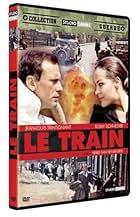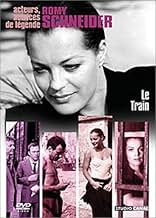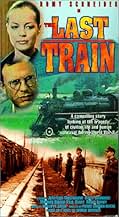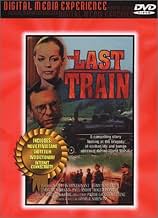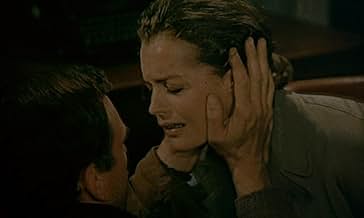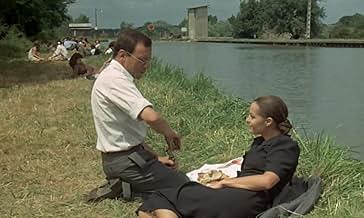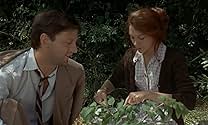VALUTAZIONE IMDb
6,9/10
1846
LA TUA VALUTAZIONE
Due persone, un francese e una tedesca ebrea, si sono incontrati su un treno mentre scappavano dall'esercito tedesco che entrava in Francia.Due persone, un francese e una tedesca ebrea, si sono incontrati su un treno mentre scappavano dall'esercito tedesco che entrava in Francia.Due persone, un francese e una tedesca ebrea, si sono incontrati su un treno mentre scappavano dall'esercito tedesco che entrava in Francia.
- Regia
- Sceneggiatura
- Star
- Premi
- 1 candidatura in totale
Recensioni in evidenza
... one of Hollywood's favourite blends. Luckily, this is not a Hollywood movie but a french one; luckily, its bitter realism wins over the sweet moving moments in one of the best-acted cinematic love stories ever. Romy Schneider and J.-L. Trintignant give a performance you won't forget even when you have forgotten most details and plot elements of this simple, but convincing film.
And also the most known French film about the 1940 French exodus, trying to escape from the Nazi invasion. You had EN MAI FAIS CE QU'IL TE PLAIT, back in 2015, also a very good movie, with the same settings. The other strength of this movie, besides the gripping story, is that the director Granier Deferre was only 13 years old at this time and actually lived this tragic period. So, he was the best placed to provide many of accurate details, that would probably not have been shown in another feature. For instance, those women who took advantage of the train stop, in the middle of the country side, to take a pee, in a field. Then a nazi plane arrives and bombards the area. Three seconds later after the smoke has left, we see the two cadavers of the poor women. Or the scene of a man, also taking a pee, standing between wagons, during a train stop ( of course;;;) Some folks have said that you have some lengths in the film, I agree, but in this kind of feature, lengths are sometimes unavoidable. If you had filled this film with plenty of action sequences, would that had been credible? Hell no. A memorable ending that would have made, even a Waffen SS trooper weep. Believe me.
I saw the film especially as admirer of Romy Schneider. I was seduced , again, by her presence and the close ups serve , in beautiful way, this cause. Her Anne , defined by bad experiences, becoming part of a story of survive and one of love, proposing a manner to resist to pressures and fears, educated , in some measure, in some form, a simple man, losting, for a period, his family, is just fair.
A war film , a trip , in the womb of a train under attacks of Nazi airplanes, a splendid scene about persecution against Jews , a great portraits of characters and inspired - dramatic end.
A beautiful film about experiences, love, refuges and radical decisions . And admirable job of Romy Schneider and Jean Louis Trintignant.
A war film , a trip , in the womb of a train under attacks of Nazi airplanes, a splendid scene about persecution against Jews , a great portraits of characters and inspired - dramatic end.
A beautiful film about experiences, love, refuges and radical decisions . And admirable job of Romy Schneider and Jean Louis Trintignant.
France during 1940 to 1943 as seen by the acute observer Georges Simenon, an author who wrote the Maigret series, admired for his penetrating insights into the traditional lives of the French. It should be remembered by non-French viewers, that the French remember their dead from The Great War (WW1) on crosses and plaques in almost every village in France. (America came to understand this on 9/11, though only three places were hit.) Also that WW1 was fought on French soil. Twenty years later they are invaded again. (Maybe they should be blamed for that because of their vengeful Versaille Treaty.) Remember also that President de Gaulle (centre right) and President Mitterand (socialist) refused to take up the accusations of France caving into Hitlers demands and becoming a puppet regime under the name of Vichy which incorporated into its own laws the Nazi anti-Jewish programs. Against this essential background, there are two of Europe's most subtle actors, Jean-Louis Trintignant and Romy Scheider, who give a haunting performance of pathos and love. They flee by a "last" train northern France in 1940, before Paris falls, to the west coast La Rochell (incidentally, the town to be the German submarine base dramatically filmed in Das Boot). Trintignant with other men and unaccompanied women have to make do in a wagon for horses. This is a significant image. Other important images are the changing countryside, the generosity of the French, the first criminal acts of war of Luftwaffe planes shooting on civilians. Trintignant shows kindness, consideration and courage in protecting Romy Schneider. The rhythm begins to liken Ravel's Bolero: he is traditional parochial French, married with children (who are in the train's better compartments), he is inexperienced with other women, ignorant of world events, so he reflects the very subdued key of the beginning of Bolero; she is a German Jew, internationally experienced, knows men, has the instinct of survival. She adds to the sharper tones in Bolero. Their relationship develops in the wagon. He is more careful to transgress marriage boundaries, she does not want to comprise him, but both slowly are drawn to each other in the steady mounting Bolera rhythm. In the wagon, others engage in sexual intercourse and soon she realizes that she must make the first move. She understands that life is to be lived each minute and so their growing love, reaching new rhythmic heights, is consummated. All is natural, natural as horses in a wagon. No morality, no anglo-saxon prudery, just natural, as one understands this on continental Europe and in the East. The bolera rhythm reaches its climax in the last minutes. Three years he has not seen her. When he was reunited with his wife and new born child in La Rochelle she on her own accord left unseen. He is called to the French National Police. The French police worked in close agreement with the Gestapo (the security police arm of the Nazi Party) and just this aspect so ignored by Presidents de Gaulle and Mitterand is where author Georges Simenon subtedly puts in the knife. At the interview, he is confronted with her, arrested for being a Jew with the French Resistance. He denies the French Secret Service Police inspector's questions, but when she is brought in, the climax and (the Boleros crescendo) is released: the last scene is so powerful, love, the essence of life, is dealt doom. Essential to see, for so many lived that life!
The film is developed during the Lightning War(Blitzkrieg) a military tactics inaugurated by Hitler and carry out by such combat commanders as General Guderian, commanding the Panzers troops, in the French campaigns of 1940. The accent was no longer placed on endless columns of soldiers marching a few miles a day. Instead of the static lines Lightning War emphasized mobility and fluidity, destroying thousands of artillery pieces as well as several French infantry divisions.The enemy was slowed down by bombing from the air all his means of communications and transportation, trains, roads and the opposing air force was destroyed on the ground. The German regular infantry , foot soldiers and motor-drawn artillery were committed to mop up resistance and join up with advances forces. The French invasion is well reflected in documentary stuff added into the movie. French people attempt to flee by any means possibles, throwing the fugitives and defenders into hopeless confusion . A radio repairman named Julien(Jean Louis Trintignant ) aboard a train with his pregnant spouse and kid. But he's placed in cattle wagon and his family in passengers cars . There Julien knows Jewish-German woman named Anna(Romy Schneider),and falls in love with her.Furthermore they befriend to remainder passengers(Regina,Serge Marquand, among others).
This is an interesting drama/war developed in a French train during the 40s and based on novel by George Simenon,'Inspector Maigret's author'.It's the feeling story about a doomed love with sweet moments and sad ending with fateful destination. Extraordinaries performances from duo protagonist, as Jean Louis Trintignant as insignificant father of family turned into enamored and Jewish saving, and an enjoyable Romy Schneider as long-suffering Jewish turned into Resistance fighter. Colorful cinematography by Walter Wottitz who also photographed 'The train' by John Frankenheimer. Emotive and atmospheric musical score by Philippe Sarde. The motion picture is well directed by Pierre Granier-Deferre who added extensive documentary footage. Writer and filmmaker Pierre Granier directed to French all-stars, Jean Louis Trintignant, Alain Delon but specially worked with Jean Gabin and Lino Ventura ; and again directed to Romy Schneider in 'A woman at her window' . Rating : Better than average.
This is an interesting drama/war developed in a French train during the 40s and based on novel by George Simenon,'Inspector Maigret's author'.It's the feeling story about a doomed love with sweet moments and sad ending with fateful destination. Extraordinaries performances from duo protagonist, as Jean Louis Trintignant as insignificant father of family turned into enamored and Jewish saving, and an enjoyable Romy Schneider as long-suffering Jewish turned into Resistance fighter. Colorful cinematography by Walter Wottitz who also photographed 'The train' by John Frankenheimer. Emotive and atmospheric musical score by Philippe Sarde. The motion picture is well directed by Pierre Granier-Deferre who added extensive documentary footage. Writer and filmmaker Pierre Granier directed to French all-stars, Jean Louis Trintignant, Alain Delon but specially worked with Jean Gabin and Lino Ventura ; and again directed to Romy Schneider in 'A woman at her window' . Rating : Better than average.
Lo sapevi?
- QuizAs Granier-Deferre had been part of the Exodus (at the age of 13), he was able to add a lot of personal observations to his description of the flight (such as people remaining cheerful despite the tragedy of the situation, nuns picking flowers in a field during a bombing raid, ...)
- ConnessioniFeatured in Romy, femme libre (2022)
- Colonne sonoreL'Attaque
Written and Performed by Philippe Sarde Et Orchestre
I più visti
Accedi per valutare e creare un elenco di titoli salvati per ottenere consigli personalizzati
- How long is The Last Train?Powered by Alexa
Dettagli
- Tempo di esecuzione1 ora 35 minuti
- Colore
- Mix di suoni
- Proporzioni
- 1.66 : 1
Contribuisci a questa pagina
Suggerisci una modifica o aggiungi i contenuti mancanti

Divario superiore
By what name was Noi due senza domani (1973) officially released in Canada in English?
Rispondi
